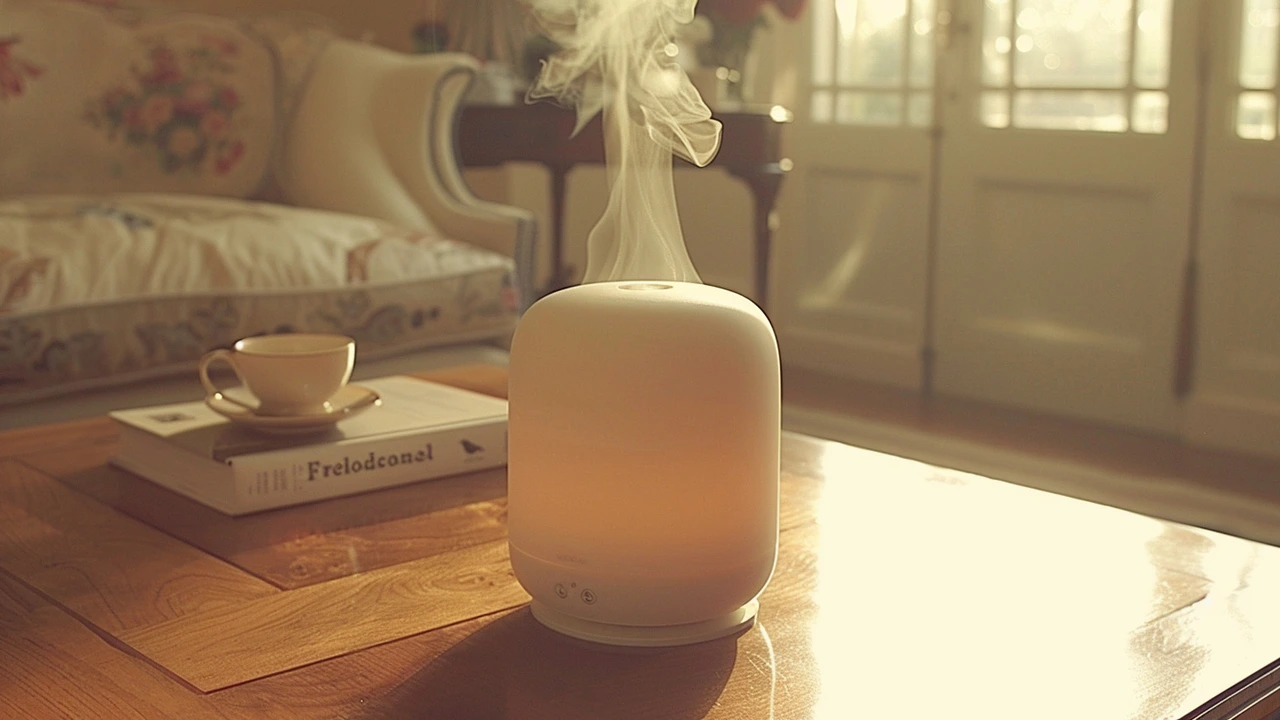Life’s fast pace can easily overwhelm us, leading to stress and anxiety. Learning how to unlock the power of calmness can be a game-changer for overall well-being.
Calmness is not merely the absence of stress; it's an empowering state of mind that allows us to face life’s challenges with grace and poise. In this guide, we'll dive into what calmness truly means, why it’s important, and how you can incorporate calming techniques into your daily routine.
- Understanding Calmness
- Everyday Practices to Cultivate Calmness
- The Benefits of a Calm Mind
- Overcoming Barriers to Staying Calm
Understanding Calmness
Calmness is a state characterized by a serene mind and a relaxed body, often depicted as an idyllic, peaceful state. However, truly understanding calmness requires a deeper exploration into its nuances, what it entails, and why it’s pivotal in our lives. Calmness is more than just a fleeting sensation; it’s a persistent feeling of tranquility that one can cultivate and maintain despite life's inevitable stressors.
One might think of calmness as an elusive sanctuary, a mental state where stress and anxiety take a back seat. It's crucial to recognize that calmness doesn't mean ignoring problems or avoiding responsibilities. Instead, it involves approaching challenges with a clear, composed mind. This state allows for better decision-making and effective problem-solving, contributing to a sense of control and resilience. According to the American Psychological Association, managing stress and remaining calm can significantly improve one’s overall well-being and productivity.
The journey to achieving calmness often begins with self-awareness. Understanding what triggers your stress and how your body reacts to it is essential. It’s about recognizing the signs of stress, such as a racing heart or shortness of breath, and then actively choosing to engage in calming practices. For instance, simple techniques like deep-breathing exercises or taking short breaks during a hectic day can be incredibly effective.
Mindfulness and Calmness
Mindfulness plays a vital role in the path to calmness. By staying present and fully engaging with the present moment, you can reduce the mind's tendency to race and wander. Studies show that mindfulness-based stress reduction (MBSR) can significantly lower stress levels and enhance one's ability to remain calm. The practice typically involves meditation, where the focus is on one’s breath, sensations, and thoughts, observing them without judgment.
It's worth noting that everyone’s journey to calmness is unique. While some might find calm in the stillness of meditation, others might achieve it through physical activities like yoga or jogging. The key is to find what works best for you. As the poet Rainer Maria Rilke once said, "The only journey is the one within." This journey helps in finding inner peace and tranquility.
Research highlights the importance of physiological calmness as well. When we are calm, our body releases fewer stress hormones like cortisol, which are linked to various health issues when present in high amounts. Consistently high cortisol levels can lead to problems such as hypertension, weight gain, and sleep disturbances. Cultivating calmness thus plays a preventive role in maintaining heart health and a robust immune system.
"Calm mind brings inner strength and self-confidence, so that's very important for good health." - Dalai Lama
In summary, understanding calmness involves acknowledging both its mental and physical aspects. It’s about cultivating self-awareness, embracing mindfulness, and recognizing the significant health benefits linked with a calm state of mind. By learning to remain calm, you don’t just improve your mental health; you lay the foundation for a healthier, more balanced life overall.

Everyday Practices to Cultivate Calmness
In our busy lives, finding moments of peace can feel like a daunting task. However, incorporating small, deliberate practices into your daily routine can make a significant difference in your quest for calmness. From mindful breathing to reconnecting with nature, even small changes can help create a ripple effect of tranquility.
One of the simplest yet most effective techniques to calm the mind and body is mindful breathing. Studies show that taking slow, deep breaths can reduce stress, lower blood pressure, and improve overall well-being. By dedicating just five minutes to mindful breathing each day, you can cultivate a sense of calm that extends throughout your daily life. Try starting your day with a few deep breaths before getting out of bed or practicing this technique during your lunch break to reset and recharge.
“If you want to conquer the anxiety of life, live in the moment, live in the breath.” - Amit Ray
Another powerful way to nurture calmness is through journaling. Writing down your thoughts, feelings, and experiences can serve as a form of emotional release and clarity. When you put your worries onto paper, they often seem less overwhelming, and you can gain insight into possible solutions or alternative perspectives. Set aside ten minutes each evening to reflect on your day and jot down anything that’s on your mind. Over time, you may find this practice brings you a greater sense of peace and understanding.
Engaging with nature can have a profound impact on our mental state. Research has consistently shown that spending time outdoors, whether it's taking a walk in the park or simply tending to a garden, can significantly decrease levels of stress and anxiety. The natural world has a calming effect, grounding us and providing a sense of perspective. Consider incorporating at least fifteen minutes of outdoor time into your daily routine, and notice how it influences your overall sense of well-being.
Physical activity is another important tool in maintaining calmness. Regular exercise releases endorphins, the body’s natural stress relievers, and promotes better sleep, which in turn reduces stress. Whether it's yoga, running, or even a dance class, find an activity that you enjoy and make it a part of your routine. Aim for at least 30 minutes of physical activity most days of the week to experience its full benefits.
Technology detox is becoming more necessary in today’s digital age. Constant notifications and screen time can heighten feelings of stress and anxiety. Set specific times during the day to unplug and disconnect from your devices. Use this time to engage in activities that you find relaxing or fulfilling, such as reading a book, cooking, or spending time with loved ones. This simple practice can help you feel more present and less overwhelmed by the constant influx of information.
Finally, cultivating calmness is greatly supported by forming a strong support network. Surrounding yourself with positive and supportive individuals can provide reassurance, different perspectives, and emotional comfort. Take time to nurture your relationships, whether it’s through regular phone calls, coffee dates, or simply being there when someone needs you. Human connection is a powerful ally in maintaining mental and emotional calmness.
Incorporate these techniques into your life and observe how they transform your experience of daily stress. By making these practices a part of your routine, you’ll not only enhance your own well-being but also create a ripple effect of calm and positivity in the lives of those around you.

The Benefits of a Calm Mind
Embracing calmness does more than just make us feel good; it has a profound impact on our physical and mental well-being. A calm mind can lead to better decision-making, sharpened focus, and enhanced creativity, making daily tasks less daunting and more enjoyable.
Physical health is one major beneficiary of tranquility. When stress levels are low, the body can better regulate systems like digestion, sleep, and immunity. Chronic stress, by contrast, has been linked to conditions like heart disease, diabetes, and gastrointestinal issues. Studies have shown that practices fostering calm, like mindfulness meditation, can lower blood pressure and reduce the risk of chronic illnesses. In a study by Harvard Medical School, the practice of meditation reduced the levels of C-reactive protein, a marker of stress-induced inflammation in the body.
Mental health sees significant gains too. Reduced stress and anxiety mean fewer mood swings and a more balanced emotional state. A calm mind is better equipped to handle life's ups and downs without resorting to unhealthy coping mechanisms. It can help manage symptoms of mental health issues like depression and anxiety disorders more effectively. According to the American Psychological Association, mindfulness and other calming strategies can decrease symptoms of anxiety by up to 30%.
Calmness also enhances cognitive functions. With a clear mind, memory and learning capabilities improve. The ability to stay calm in stressful situations promotes better problem-solving and planning. The National Institute of Mental Health reports that individuals who regularly practice mindfulness-based stress reduction show improved cognitive resilience, which means they bounce back from challenges quicker and with less emotional toll.
Social relationships benefit from a calm demeanor as well. Interpersonal conflicts are easier to navigate with a level-headed approach. Communication becomes clearer, and empathy is enhanced when stress and anxiety are minimized. This stronger emotional awareness can lead to deeper connections and more meaningful relationships. Dr. Daniel Goleman, a well-known psychologist, emphasizes that emotional intelligence, which includes managing emotions and staying calm under pressure, is key to successful relationships both personally and professionally.
Lastly, a calm mind fosters an overall sense of happiness and satisfaction. When your mind is at peace, you are more likely to experience life’s simple joys and be present in the moment. This presence can enhance everyday activities, from enjoying a meal to spending time with loved ones, leading to a more fulfilling life. In a survey conducted by the Happiness Research Institute, individuals who practice mindfulness reported a 20% increase in levels of long-term happiness compared to those who don’t.

Overcoming Barriers to Staying Calm
Staying calm is easier said than done, especially with the myriad of distractions and challenges we face daily. However, understanding and overcoming common barriers can make a significant difference in maintaining a state of tranquility.
One primary hurdle is the constant influx of information. We are bombarded with news, emails, social media updates, and more, which can become overwhelming. To manage this, try to set specific times during the day to check these sources. Additionally, turning off non-essential notifications can help reduce the overload and allow you to focus on more meaningful activities.
Another common barrier is negative self-talk. Many people struggle with an inner critic that constantly undermines their confidence and increases anxiety. A useful technique to combat this is practicing self-compassion. Instead of berating yourself for mistakes, acknowledge that everyone errrs and it’s a part of the learning process.
“Self-compassion involves treating yourself with the same kindness and understanding as you would a good friend during tough times,” notes Dr. Kristin Neff, a pioneer in self-compassion research.
Demands from work can also be a significant stressor, making it hard to stay calm. Learning how to effectively manage your time can alleviate some of this pressure. Start by prioritizing tasks and breaking them down into smaller, more manageable steps. This approach can help you avoid feeling overwhelmed and allow you to tackle one thing at a time.
Another important aspect is setting boundaries. Whether at work or in personal relationships, it is crucial to know your limits and communicate them effectively. Saying ‘no’ when necessary can protect your time and energy, contributing to a calmer mindset.
Lastly, sleep deprivation can severely affect your ability to stay calm. Lack of sleep impairs cognitive function, making it difficult to handle stress. Establishing a regular sleep schedule and creating a relaxing bedtime routine can improve the quality of your sleep. This might include turning off electronics an hour before bed, reading a book, or practicing gentle stretches.
Overcoming these barriers takes practice and patience. It's about making small, consistent changes that collectively lead to a more peaceful state of mind. The journey towards calmness is ongoing, but with these strategies, you’ll be better equipped to navigate life’s challenges with confidence and grace.






